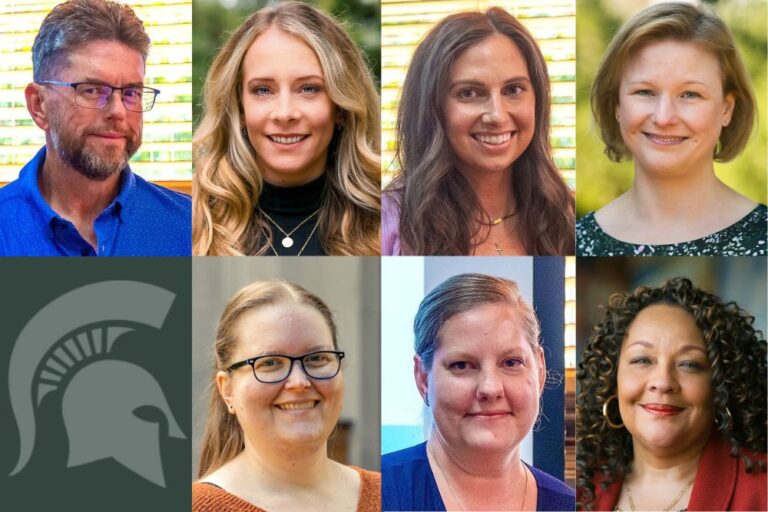Michigan State University received a 2023 Responsible Computing Challenge Award for $150,000 from the Mozilla Foundation to center African perspectives in technology course/curriculum redesign.
The 12-month project, “Reimagining Information Communication Technology and Development (ICTD): Developing and Implementing an African-Informed Approach to Global Technology Design,” is led by Susan Wyche, Associate Professor in the Department of Media and Information, and Jonathan Choti, Associate Professor in the Department of Linguistics, Languages, and Cultures.

Their project aims to bridge the gap between technology design and humanities by encouraging critical thinking, reflection on cultural biases, and the establishment of a unique Technologists-In-Residence Program (TIR) that will build upon MSU’s longstanding relationship with faculty and students at Kenya’s Egerton University.
Closely aligned with MSU’s broader DEI, global impact, and digital innovation initiatives, Wyche and Choti seek to redefine how ICTD is taught and practiced — with a focus on interdisciplinary teaching, project-based learning, and cross-cultural collaboration.
Radically Interdisciplinary Teaching
Wyche, whose research is centered in the ICTD space, also teaches courses on prototyping and qualitative methods in the College of Communication Arts and Sciences. She has studied technology use and design in Kenya for more than 15 years. Choti is an accomplished African studies scholar and linguist in the College of Arts & Letters. Together, they will redesign and co-teach the ICTD Project capstone course during the Spring 2024 semester.
Their combined experience, both in their respective fields and in developing interdisciplinary courses, will be strengths in leading the necessary intervention of ICTD curricula.
“Africa’s role in the world today is partially, if not wholly, linked to the economic inequalities in the world that disadvantage Africa: (neo)colonization, slave trade, religious and linguistic dominance, and the devaluation of African currencies.”
Dr. Jonathan Choti
“Courses aimed at designing technology for developing countries tend to reproduce a narrative that Africans are technologically backwards, lack innovation, and only use technology and do not develop it,” Wyche said. “A goal of our course is to demonstrate to students that this approach is a myth — in fact, Africa is a site of technological innovation.”
Choti’s background will help emphasize African issues, ideas, perspectives, processes, and influence in international interactions (especially regarding innovation and ICTD) through the arts and humanities.

“Africa’s role in the world today is partially, if not wholly, linked to the economic inequalities in the world that disadvantage Africa: (neo)colonization, slave trade, religious and linguistic dominance, and the devaluation of African currencies,” Choti explained.
The course will encourage students to learn more about African societies, history, and cultures — while engaging critically with their own — to develop a more global understanding of technology usage.
“Students will use a ‘Human-Centered Design’ framework when developing their technology ideas,” Wyche said. “HCD is a highly interdisciplinary design approach that will empower students to think about how the social and political context of computing can inform design.”
Cross-Cultural Collaboration
Both Wyche and Choti are affiliated with MSU’s African Studies Center, home to more than 100 core faculty from more than 40 different disciplines.
“MSU is an ideal place to do this work,” Wyche said. “The university is widely considered a leader in Africa-related research.”
More than that, students will have unprecedented opportunities for cross-cultural collaboration.
“MSU students will learn from the lived experience and perspectives of Kenyan students regarding technology design,” Choti said. “Kenyan students will experience the curriculum of a U.S. university and learn about pedagogy and project design by students in a Media and Information course.”
“MSU is an ideal place to do this work. The university is widely considered a leader in Africa-related research.”
Dr. Susan Wyche
The TIR program is a natural extension of Michigan State University’s other programs that support collaboration with African scholars. The project is expected to have a profound impact on students, challenging stereotypes and broadening their perspectives on technology and innovation in Africa.
Students from all majors are welcome to enroll in the course, which will conclude with a campus-wide event showcasing the students’ projects. Interested students are encouraged to reach out to Wyche and Choti prior to 2024 course enrollment.
By offering a model for other institutions to follow, Wyche and Choti hope that more programs will ensure diverse perspectives are centered in technology design.
Written by Jessica Mussell and originally published on the College of Communication Arts and Sciences website.


